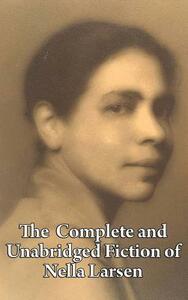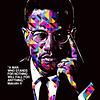Take a photo of a barcode or cover
tough to rate a book of short stories, some of the works are 5-star and some are 3-star
adventurous
informative
tense
fast-paced
Plot or Character Driven:
Character
Strong character development:
Complicated
Loveable characters:
Complicated
Diverse cast of characters:
Yes
Flaws of characters a main focus:
Yes
emotional
reflective
tense
slow-paced
Plot or Character Driven:
Character
Flaws of characters a main focus:
Yes
challenging
emotional
reflective
sad
medium-paced
Plot or Character Driven:
Character
Strong character development:
Complicated
Loveable characters:
Complicated
Diverse cast of characters:
Yes
Flaws of characters a main focus:
Yes
I was drawn to this book by the novella Passing, but the thing that stands out most from the two novellas and three short stories by Nella Larsen contained here are their psychological intensity. It is unflinching, which can almost be exhausting at times, but also makes these stories worth reading.
Out of the three short stories, "Freedom" feels maybe slightly less vibrant from being entirely in one character's head, but even then the line "He had forgotten all but the past, and that was brightly distorted," is undeniably one of the better lines I've ever hit in a work of fiction. And it's wholly indicative of the psychological intensity that makes the three stories work.
Of Larsen's two novellas, Quicksand was the more difficult read. Not because you couldn't sympathize with the main character, but because her situation was so very depressing. Its heroine, Helga Crane, is biracial and only able to be happy for short periods at a time. She did well for a time teaching at a southern black school, only to realize she had no real place there and was stifled. She returns home to Chicago to discover her last remaining relative (her white uncle) will no longer acknowledge her because his newly married wife objects to Helga's heritage. And it goes on like this! From Harlem to Copenhagen, and then back to the American South, Helga finds what she thinks is happiness, only to realize the world will not accept her, no matter where she goes.
Passing also deals with biracial identity (and also ends in tragedy), but the atmosphere is less suffocating--perhaps because you don't have the continual startup and collapse that Helga's life does in Quicksand. It's more about the allure of being able to move between the worlds of America's racially stratified society, even if being able to do so only highlights how much (or how little) those different worlds might accept you if they knew who you are, rather than who you present yourself to be. This all is personified by two biracial women that can pass, and their attractions or conformities to the worlds they live in (and perhaps their attraction to each other) really propels this novella forward.
Discussion of Passing seems to suggest it's from something of a bygone era, with being able to "pass" for White, etc., not quite having the same... cachet (or maybe relevance?) it used to, but the novella's exploration of identity is one that anyone can and should be able to connect to. We all live different roles at work/school and at home, and that is the connecting point for any of us in the 21st century with these characters early on in the 20th.
Out of the three short stories, "Freedom" feels maybe slightly less vibrant from being entirely in one character's head, but even then the line "He had forgotten all but the past, and that was brightly distorted," is undeniably one of the better lines I've ever hit in a work of fiction. And it's wholly indicative of the psychological intensity that makes the three stories work.
Of Larsen's two novellas, Quicksand was the more difficult read. Not because you couldn't sympathize with the main character, but because her situation was so very depressing. Its heroine, Helga Crane, is biracial and only able to be happy for short periods at a time. She did well for a time teaching at a southern black school, only to realize she had no real place there and was stifled. She returns home to Chicago to discover her last remaining relative (her white uncle) will no longer acknowledge her because his newly married wife objects to Helga's heritage. And it goes on like this! From Harlem to Copenhagen, and then back to the American South, Helga finds what she thinks is happiness, only to realize the world will not accept her, no matter where she goes.
Passing also deals with biracial identity (and also ends in tragedy), but the atmosphere is less suffocating--perhaps because you don't have the continual startup and collapse that Helga's life does in Quicksand. It's more about the allure of being able to move between the worlds of America's racially stratified society, even if being able to do so only highlights how much (or how little) those different worlds might accept you if they knew who you are, rather than who you present yourself to be. This all is personified by two biracial women that can pass, and their attractions or conformities to the worlds they live in (and perhaps their attraction to each other) really propels this novella forward.
Discussion of Passing seems to suggest it's from something of a bygone era, with being able to "pass" for White, etc., not quite having the same... cachet (or maybe relevance?) it used to, but the novella's exploration of identity is one that anyone can and should be able to connect to. We all live different roles at work/school and at home, and that is the connecting point for any of us in the 21st century with these characters early on in the 20th.
4.5 Stars. Larsen has a superior way of laying out human emotion, especially a woman's emotion, that is unlike any other author I can think of. At times I could feel the agitation, the hurt, the longing, right along with Irene and Helga. Larsen's style of writing, particularly in Quicksand, put me off at times--there were paragraphs with miles of clauses and commas strung together, and sometimes odd construction of sentences. Regardless, the quality and emotional depth to her writing touches on facets of humanity that not many authors are capable of doing.
Nella Larson's works, especially "Passing" and "Quicksand," stand out as strong social commentaries on gender and race during a time where daring to buck the norms were dangerous to one's livelihood and life. In "Quicksand," the main character, Helga Crane, who is a biracial woman, struggles to find her identity. Not finding her identity in a Dutch society where she's viewed as a novelty more than anything, she returns to the Untied States where she finds the man that she was interested in before traveling abroad and her best friend are married. Longing for companionship, she rushes into a marriage with a preacher and lives out her days being an unhappy wife and mother. In "Passing," the main character, Clare Kendry, is also biracial, and she is living a double live that can cost her more than a lost of status. Her bigoted husband don't have a clue about her true identity, and when he realizes that he's been played the fool, it could spell disaster for Clare. One thing that struck out for me about both stories. When race wasn't an issue, every character in the two stories seemed to be at ease with themselves. As soon as race became an issue, it became a problem that made everyone miserable, which, when we force social constructs on society, will happen.
The short stories: 3/5
Quicksand: 5/5
Passing: 4/5
Total: 4.5/5
.
Quicksand: 5/5
Passing: 4/5
Total: 4.5/5
She hated white people with a deep and burning hatred, with the kind of hatred which, finding itself held in sufficiently numerous groups, was capable someday, on some great provocation, of bursting into dangerously malignant flames.As much as things have changed and as much new material I've been exposed to, my ratings for Larsen's works have not. I'd follow this up with a common "for good or for ill", but considering the track record I've been having with revisiting authors who have penned favorites, I'm going to stay content with the good. Much as Larsen specializes in the pithy, I found each of her short stories a bit too short, the minute twitches of her razor sharp analysis of emotions compacted a side too much into the realm of melodrama to make for quality engagement. Her novels, though, give her incisive whip crack of a wit and writing style enough room to fly to endings which, if unhappy, are all too realistic, and soaked to the gills with a world that the US has not, for all its efforts to deny such, moved past.
But she aped their clothes, their manners, and their gracious ways of living.
[N]o matter what the intensity of his feelings or desires might be, he was not the sort of man who would for any reason give up one particle of his own good opinion of himself.It's not actually a good thing for a classic to still be relevant due to its particular descriptions of institutionalized pain and oppression. This gives the group that has been dishing out such an excuse to render its view of the constructed Other myopic, as evidenced by the plethora of slave narratives receiving adulation in the film awards and other such trumpeted evaluation systems. The creative mind is free, but if the only images of certain groups that are raised to the easily accessible realm of public perception are those consigning them to hell on earth, it renders fiction just another tool of the hegemonic armory. It's a good thing, then, that Larsen has the skill to take on not only antiblackness, but the associated misogynoir and trope of the tragic mulatto in a fashion that, while focused on heroines forced to face monsters they never should have faced, redirects and deconstructs every threat faced, physical and non. This is the difference between fiction and solidification: the first takes life and gives it the means to set itself free, while the second slops together a various selection of dehumanizations and slews it out for the sake of status-quo reinforcing entertainment and the next injection of capitalism's carrot.
In that second she saw that she could bear anything, but only if no one knew that she had anything to bear.After a reread, I can see why [b:Passing|349929|Passing|Nella Larsen|https://images.gr-assets.com/books/1388214730s/349929.jpg|2369306] is clinically superior: it is less erratic, more believable, and shapes itself around the more volatile segments of [b:Quicksand|78257|Quicksand|Nella Larsen|https://images.gr-assets.com/books/1386924645s/78257.jpg|27633] rather than centering itself through it. However, as unbelievably as Helen Crane hurls herself through life, the leaps of faith she makes again and again are much closer to my heart and my own experiences than the tenacious grip Irene Redfield keeps on her domestic stability, and so the more self-contained and plot arc-conforming pass me by by a smidgen. One thing [b:Passing|349929|Passing|Nella Larsen|https://images.gr-assets.com/books/1388214730s/349929.jpg|2369306] has in it that [b:Quicksand|78257|Quicksand|Nella Larsen|https://images.gr-assets.com/books/1386924645s/78257.jpg|27633] doesn't have is intimations at bisexuality, and while the Wiki goes straight for lesbianism, the most Irene does is find both men (yes, even her husband/so called beard) and women extremely attractive, so monosexuals are just going to have to chill. I'll also admit that [b:Passing|349929|Passing|Nella Larsen|https://images.gr-assets.com/books/1388214730s/349929.jpg|2369306] has the better ending
Spoiler
: There's nothing quite like the feeling of maybe having gotten away with murderHere were no tatters and rags, no beggars. But, then, begging, she learned, was an offense punishable by law.I look forward to future rereads.
This book includes three short stories and two short novels. The short stories are The Wrong Man, Freedom, and Sanctuary. The novels are Quicksand and Passing. I did not read Passing, as I had previously read it as a stand alone book. The stories explore black life, mostly upper class, in the 1920's. In many ways, it seems not much has changed. The volume also includes a forward and an introduction which explain writings and life of Nella Larsen, the author. (Why is she listed here as editor?)
I found The Wrong Man amusing; the other two short stories less memorable. Quicksand, said to be some what autobiographical, explores the life of Helga Crane, a mixed-race woman, as she enters adulthood and seeks to find her place in the world. Helga goes from one situation, and often relationships, to another. She seems to find "happiness" for a while, then becomes disillusioned. The last chapters, the turn Helga's life took, was a little surprising and I found myself thinking about the recently read Henry Louis Gates' book on the black church. (Is it coincidence or natural when books and subjects collide?) Nella Larsen is an important writer of the era and an interesting person as well. Her stories have made me think about a lot of things, not just race.
I found The Wrong Man amusing; the other two short stories less memorable. Quicksand, said to be some what autobiographical, explores the life of Helga Crane, a mixed-race woman, as she enters adulthood and seeks to find her place in the world. Helga goes from one situation, and often relationships, to another. She seems to find "happiness" for a while, then becomes disillusioned. The last chapters, the turn Helga's life took, was a little surprising and I found myself thinking about the recently read Henry Louis Gates' book on the black church. (Is it coincidence or natural when books and subjects collide?) Nella Larsen is an important writer of the era and an interesting person as well. Her stories have made me think about a lot of things, not just race.
This book was extremely well written and thought provoking. The only reason I give it 4 stars instead of 5 is because the endings were kind of unsatisfying. I assume that was a literary choice given the subject matter, and the fact racial issues don't often have a satisfying ending for African Americans. Nevertheless I found the ending of Passing specifically to be confusing. I couldn't quite grasp what message Larson wanted to communicate with the ambiguity of Clare's death. In QUicksnad, I thought the ambiguity of the ending was well done, and perfectly ended the sadness of Irene's displacement and struggle.



